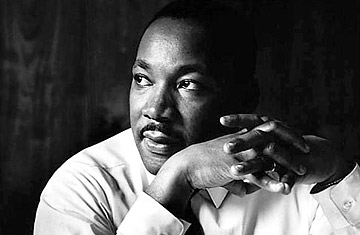
(11 of 11)
King rises at 6:30 a.m. and goes to his study for 45 minutes of reading. Then he has fruit juice and coffee for breakfast, and at 9 o'clock drives to his office in one of his two cars (a 1960 Ford and a 1963 Rambler). There he goes to work in a 16-ft.-square room filled with perhaps 200 volumes on Negro and religious subjects; he checks his mail (about 70 letters a day), writes his speeches and sermons, confers with aides and, by telephone, with civil rights leaders around the country. He usually eats his lunch at his desk, then continues working, often until 2 or 3 o'clock the next morning.
Redemption. More and more, King spends his time in airplanes, journeying to the far corners of the U.S. to speak and preach to huge audiences. He traveled about 275,000 miles in 1963 and made more than 350 speeches. Wherever he goes, the threat of death hovers in the form of crackpots. "I just don't worry about things like this," he says. "If I did, I just couldn't get anything done. One time I did have a gun in Montgomery. I don't know why I got it in the first place. I sat down with Coretta one night and we talked about it. I pointed out that as a leader of a nonviolent movement, I had no right to have a gun, so I got rid of it. The quality, not the longevity, of one's life is what is important. If you are cut down in a movement that is designed to save the soul of a nation, then no other death could be more redemptive."
It is with this inner strength, tenaciously rooted in Christian concepts, that King has made himself the unchallenged voice of the Negro people—and the disquieting conscience of the whites. That voice in turn has infused the Negroes themselves with the fiber that gives their revolution its true stature. In Los Angeles recently, King finished a talk by saying: "I say good night to you by quoting the words of an old Negro slave preacher, who said, 'We ain't what we ought to be and we ain't what we want to be and we ain't what we're going to be. But thank God, we ain't what we was.'"
After 1963, with the help of Martin Luther King Jr., the Negro will never again be where or what he was.
* The desegregation order still holds, but older Montgomery Negroes have since reverted to a somewhat loose pattern of segregated seating, rarely, for example, will a white rider and a Negro sit beside each other.
